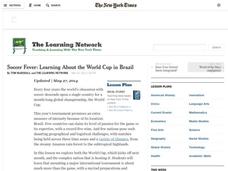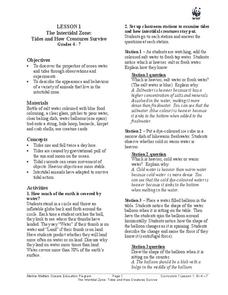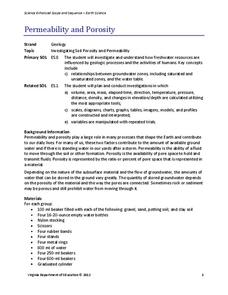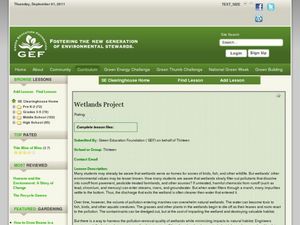Maryland Department of Education
The Concept of Diversity in World Literature Lesson 9: Debating Imperialism
To gain an understanding of Imperialism, class members read Rudyard Kipling's poem, "The White Man's Burden" and Mark Twain's essay, "To the Person Sitting in Darkness." Groups compare these perceptions of non-white cultures with the...
Curated OER
Tides - The Ins and Outs of Tides
Get your junior oceanographers to generate tidal prediction graphs on an interactive website. They will feel like experts in the field, or shall we say, experts in the ocean! This is a brief, but worthwhile activity that could be used to...
Curated OER
The Magic School Bus Goes to Mussel Beach
Students investigate tides and create a model of an intertidal zone. In this hands-on marine science lesson plan based on a Magic School Bus book, the teacher leads students in a discussion about tides, then helps students model a tide...
PBS
Journalism in War Time: What Does the Public Need to Know?
A viewing of the documentary War Feels Like War, launches an exploration of the importance of accurate and comprehensive war reporting. Groups investigate various news agencies and assess the factors that influence their stories. A...
Curated OER
Entering the Twilight Zone
Students describe major features of cold-seep communities and the process of chemosynthesis as it relates to organisms in each habitat. In this deep-sea habitats lesson plan, students study the categorization of ocean habitats according...
National Wildlife Federation
It's All in the Name: Weather Versus Climate
What goes up when rain comes down? An umbrella! Activity eight in the series of 12 explores weather and climate. In pairs, participants analyze maps, watch a short video, create a weather forecast, and complete a reading to determine the...
Curated OER
Football Spelling
Third graders play a football spelling game where two teams spell words and gain yardage for each correctly spelled word. This clever spelling game will be highly motivational for your class! Each team gains ten yards every time they...
Curated OER
Zones of the Rocky Intertidal Zones
Sixth graders predict intertidal zones for organisms. In this intertidal zones lesson, 6th graders analyze an illustration of an organism and a class diagram of the intertidal zones. Students research to locate the zone the organism is...
Curated OER
Zone Ball
Students are introduced to the basics about zone defense in basketball. In groups, they practice this technique to turn away from gravitating to the ball handler. They also complete non-bounce passes and examine how to move without a...
The New York Times
Soccer Fever: Learning About the World Cup in Brazil
What an incredible collection of ideas for teaching about the 2014 World Cup in Brazil! This resource is packed with news articles and instructional activities on a wide variety of topics, from the global popularity of soccer and the...
Curated OER
'Tis a Long, Long Way to Tipperary!
Students practice finding the location of cities across the world by using an interactive Web site, and figure out the world's time and the value of time zones the world over.
Curated OER
Scrambled States
Learners read or are read the story "Scrambled States". Using a map, they identify their states and time zones. They predict their states representation in the book and discuss it after the book is finished. They discvor the differences...
Curated OER
The Intertidal Zone: Tides and How Creatures Survive
Young scholars study the properties of ocean water and tides and learn about animals that live in intertidal zones. In this intertidal zone instructional activity, students participate in classroom stations to learn about fresh water and...
Ocean and Coastal Interdisciplinary Science
The Dark Ocean
Is the ocean blue at all depths? Nope! Explore the science behind the light spectrum in deep, dark waters. The lesson plan recommends watching The Blue Planet: Open Ocean—The Deep, but it's not integral, or you can substitute another...
Virginia Department of Education
Permeability and Porosity
Covering both permeability and porosity, scholars perform a hands-on experiment testing various soil types. The material includes a pre-lesson worksheet to help focus pupils on the task at hand.
US Institute of Peace
Becoming a Peacebuilder
"Be the change you wish to see in the world!" The 15th and final lesson in a peacebuilding series uses this quote from Gandhi to prepare pupils for their own action projects. Individuals research a global issue, then brainstorm a method...
Curated OER
Lesson 1 Activity 1: Tools of the Ancients
Students examine how Christopher Columbus determined his latitude.
Science Matters
A Model of Plate Faults
The San Andreas fault is one of the longest fault zones in the world. In a series of 20 lessons, the fourth lesson has pupils use a paper model to recreate various types of plate faults. Each is held in position then drawn into a science...
Space Awareness
Climate Zones
The climate at the equator is hotter than the climate at the poles, but why? The lesson plan goes in depth, explaining how the angles of illumination relate to the heating rate at different latitudes and seasons. Scholars use a strong...
Space Awareness
The Climate in Numbers and Graphs
Weather versus climate: weather relates to short time periods while climate averages the weather of a period of many years. Scholars learn about average temperature and precipitation in various climate zones and then apply statistics...
Curated OER
Land Use
Students brainstorm lists of land uses, gather pictures of them, and create a collage. They research land uses in their communities by contacting local agencies. They make charts of the land use planning systems and their impact on...
Curated OER
Safe Food
There is so much information in this lesson. A very comprehensive unit plan about food safety can be broken up into smaller pieces so as not to overwhelm the class with so much information at once. Some of the topics include handling...
Curated OER
Wetlands in a Pan
Fifth graders explore the wetlands to discover its benefits in removing pollutants in the water. In this wetlands activity, 5th graders discuss how stormwater wetlands are created to purify water. Students test the water.
Curated OER
The Science of Lance Armstrong
Live Strong! High schoolers will discuss some of the reasons behind Lance Armstrong's success in cycling and chart those reasons into four categories: Physiology, Psychology, Equipment, Training/Strategy. They will then choose one sport...

























